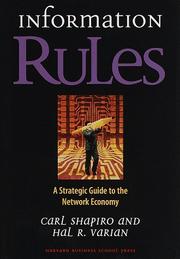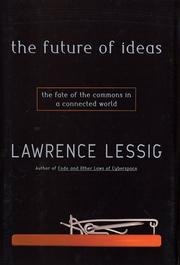Information feudalism: who owns the knowledge economy?
by Peter Drahos, John Braithwaite - ISBN 1853839175 - Earthscan 2002
note that this was finished much earlier but without recall, recall starts a month before the current date to already start with very spaced recalls
Motivation
- my earlier visit to INPI in France
- find patterns of "proprietisation"
- how does the immaterial nature of knowledge change anything
- are we seeing similar patterns of "fencing" around a physical space, are older studies like Qu'est ce que la propriete ? still relevant
- how did we end up with the current IP situation
- how will it evolve (can we see trends)
- can it be applied to more mechanisms of the knowledge economy
- business models
- business processes
- Process Wiki industry standard business process models designed in BPMN
- RunMyProcess Web platform specialized in building and running workflows and business process based applications (BPM)
- evolution or organisms (as genes car be regulators)
Reading
- Preface
- "Our work suggests that governments rarely take a cost-benefit approach to intellectual property. The intellectual property standards we have today are largely the product of the global strategies of a relatively small number of companies and business organizations that realized the value of intellectual property sooner than anyone else."
- Chronology of Key Events
- very recent (starting from 1972) and suggest that the book focus on micromanagement of IP rather than a broader picture
- still that is probably an interesting viewpoint as it depicts realistic actions rather and an idealized view on knowledge
- history is actually later described in A Little Intellectual Property History in the second chapter (p29-38)
- TRIPS (Trade-Related aspects of Intellectual Property Rights) seems to be a corner stone of the idea exposed in the book
- Chapter 1 - Introduction
- "The dangers of central command and loss of liberty flow from the relentless global expansion of intellectual property systems rather than the individual possession of an intellectual property right. It is these expanding systems of intellectual property that have enabled a relatively small number of corporate players to amass huge intellectual property portfolios." (p5)
- "Underneath the development ideology of intellectual property there lies an agenda of underdevelopment. It is all about protecting the knowledge and skills of the leaders of the pack." (p12)
- democratic bargaining which did not represent TRIPS and other international IP situations (p14-15)
- all relevant interests have to be represented in the negotiating process (the condition of representation)
- all those involved in the negotiation must have full information about the consequences of various possible outcomes (the condition of full information)
- one party must not coerce the others (the condition of non-domination)
- Chapter 2 - Piracy
- presentation of the history of IP
- either keeping a competitive advantage by establishing and enforcing legislation (dominant position)
- or by gaining one by not respecting it (challenger position)
- strategies employed at the institution level as well as to the nation level
- association of connoted words
- "The cost to business everywhere of this agreement has been increasing surveillance by the state on behalf of intellectual property owners. For some citizens it has meant new forms of servitude." (p38)
- see also A brief history of intellectual property according to mattdorn.com 2007
- Chapter 3 - The Knowledge Game
- emergence of the knowledge economy conceptually in the 20th century while arguing that "the management of knowledge is and always has been the main game." (p39)
- "Edison in fact managed an 'invention factory'. Its production goal was to produce 'a minor invention every ten days, and a big one every six months or so'." (p40)
- "the nature of patent ownership underwent a change. In the 19th century most patents were owned by individuals. Surprisingly early in the 20th century the bulk of patents came to be owned by big business" (p47-48)
- "The patent attorney profession, which had swollen in number to service the demands of big business, played the role of myth-maker, portraying the system as the servant of the heroic inventor. Underneath the promises the patent system was becoming the sophisticated bureaucratic arm of big business, a system which big players used to outmanoeuvre opponents or, where this was not possible, to unite with them." (p48)
- presentation of cartel mechanisms
- Chapter 4 - Stealing of the mind
- original article kindly provided upon requested by NYTimes.com (as it was unavailable on their onlines archives during mid-june 2009)
- linking the issue of intellectual property protection to the trade regime
- 301 process in the US = trade retaliation (1984)
- explaining the process including the framing of the associated discourse
- linking the trade regime to investment (p68)
- role of different key actors from the industry
- Chapter 5 - The Illusion of Sovereignty
- role of Berne Union (BIRPI)
- explanation of social cost of textbooks in emerging countries and the export of other culture goods
- old-habits of former colonies
- Chapter 6 - The Bilaterals
- restating the key role of linking trade, and thus trade sanctions, with IP
- involvement of governments, especially the US, with emerging countries, to enforce
- International Intellectual Property Alliance (IIPA) formed in 1984 and qualified as one of the most influential lobbyist group
- "views of those in the USTR began to correspond with those of the IIPA" (p96)
- "'Intellectual property is really an issue of survival within the world system' (1995 interview). It is the price that countries have to pay, largely to US companies, to enter the world trading system." (p104)
- Chapter 7 - Agendas and Agenda-setters: The Multilateral Game
- GATT
- Jacques Gorlin's "A Trade-Based Approach for the International Copyright Protection for Computer Software" 1985 and its recommandations
- Chapter 8 - Persuasion and Principles
- IPC, UNICE, Keidanren
- drafting TRIPS and preparing the negociations
- different interests from different parts (Hollywood, computer industry, ...)
- Chapter 9 - At the Negotiating Table
- strategy of recursively smaller negociations groups in which key players (US+Europe) are always present
- "As the TRIPS negotiations descended into higher levels of informality the '10+10' was contracted or expanded to '3+3' or '5+5' or a group of 25 depending on the issue (GATT, 1993 interview). These informal groups became the real places of action." (p138)
- "The transparency of the TRIPS negotiations was in some ways like the transparency of a one-way mirror." (p138)
- "for the key players (the US and the European Community), TRIPS offered the opportunity to globalize their own domestic models of regulation." (p143)
- "At an interview with the EPO [European Patent Office] in 1993 we were told that 'everything would be patentable; it's just a question of time'." (p144)
- "North-North negotiating issues were very much about how global industries could make further gains in developed country markets. For developing countries the TRIPS negotiations were essentially about trying to minimize their losses." (p145)
- "Ten years is a long, long time in the life of a CEO. Moreover, it was these CEOs that paid the fees that kept the lobbyists in business." (p147)
- position such as "director of government relations" clearly show the ability of large corporation to leverage the right political resources
- see JobsInLobbying.com to study requirements for such positions
- reminds me of a fraternity member in Berkeley studying "fund raising" and adept of serious social networking who recommend me NeverEatAlone
- "After the conclusion of the Uruguay Round on 15 December 1993, the Final Act Embodying the Results of the Uruguay Round of Multilateral Trade Negotiations was signed on 15 April 1994. [...] The time had come for the US to begin collecting rents from the rest of the world." (p149)
- Chapter 10 - Biogopolies
- "Patent law, as we shall see, has become one of the main mechanisms by which public knowledge assets have been privatized." (p150)
- privatization of the intellectual commons
- three private purposes: (p150)
- 1 to obtain monopoly control of any knowledge in any field that is likely to prove important to commerce in some way;
- 2 to enable the formation of cartels;
- 3 to reduce the costs to industry of obtaining patents.
- explanation of market division on the internation scale
- 'networking' of intellectual property portfolios
- "Rather than live in a world of mutually assured patent litigation, these companies swapped patents in order to form a producers’ cartel. The prices of antibiotis like tetracycline were held constant" (p153)
- something that according to progress in productivity should not be the case with constant decreasing costs (pushed by competition) that would repercuted on final price... in a free market economy, but the patent system blocked such a mechanism
- important role of the public sector, especially university, with the "risk" that they would discover something before the private sector and thus making it not patentable (and thus, much less profitable)
- level of application (DNA, protein, micro-organism, ...)
- discovery vs invention problem (is the sequence really new or does it exist since ages)
- patent engineering "tricks" (patenting the "purification" process) that were already used in chemistry
- utility problem (patenting a sequence without knowing how it could be used)
- brief history of changes in the patent system (plants, seeds, ...)
- The Plant Patents Act of 1930
- Plant Variety Protection Act of 1970
- "Not many companies can build patent portfolios that stretch across the jurisdictions of the world. [...] It is a private bargaining power, used behind the curtain of commercial-in-confidence, making its effects hard to measure. Bargaining can easily stray into bullying when one side has so many intellectual property levers at its disposal." (p162)
- "It [Bayh-Dole and other legislation that Congress passed in the 1980s] integrated universities much more deeply into the corporate knowledge game." (p163)
- "The US private sector needs the funding of basic public science to continue. The challenge for it has been to find ways in which to uplift this basic research from the public domain and utilize it in commercial strategies." (p165)
- "The price we pay in the form of patents to biogopolists is not the price of the discovery as they would have us believe, but the price of development and distribution." (p167)
- Chapter 11 - Infogopolies
- "the threat was not so much to entire industries as to individual players who did not want to lose their position of dominance." (p167)
- history of IBM and his successive shifts from and away of software patents
- history of the film and music industry and how majors build an international strong network of distribution
- claiming "free market" requirements in other overseas market that were not as ready and organized as they were
- Chapter 12 - Democratic Property Rights
- term "intellectual commons" (p188) is used in a broader and less technical way than Cognitive Commons
- "This book can be read as a treatise on why and how these conditions of representation, information and non-domination [ all 3 detailed earlier ] have not been met in the development of the global intellectual property regime over the past two decades." (p190)
- summing-up for each condition the different chapters where it was expanded and drawing the process in which TRIPS was consequently acccepted
- "a story of visionary individuals like Jacques Gorlin, Eric Smith, Jack Valenti and Edmund Pratt who imagined the simple idea of linking intellectual property to the trade regime." (p195)
- the entire last paragraph summarize very well the entire situation as a maintenance of the economical gap by maintenant the divide through those new IP mechanisms
- Chapter 13 - Resisting the New Inequality
- "where wealth came from.
- In an industrial economy wealth came from controlling capital and labour.
- Our analysis of information feudalism is that the TRIPS visionaries saw wealth as coming from controlling abstract objects like patents." (p198)
- "Marx also saw that the new dominion also brings in new inequalities that in some ways build upon persistent inequalities of the old order." (p199)
- "New colonies today are universities. Scientists increasingly are vassals of knowledge corporations. They starve scientifically unless they generate ideas corporations are interested in buying and selling. As scientists sell more of their ideas to multinationals, they enslave themselves as trespassers on their own intellectual commons." (p201)
- "patentable inventions should:
- (1) pass meaningful standards of patentability;
- (2) be linked to a full disclosure of know-how test; and
- (3) not threaten, through the issuance of the patent, any fundamental human right as defined by the international human rights instruments the state has ratified." (p205-206)
- Chapter 14 - Publicness of Knowledge On the Importance of the
- "The risk of information feudalism is that it will lead us into a post-competitive order." (p216)
- "One obvious effect of this [increase of university patent players] is that an important societal source of public goods is drying up. At an individual level researchers become less motivated to explore areas of research where there is not some patent payoff." (p217)
- "Information feudalism is a regime of property rights that is not economically efficient, and does not get the balance right between rewarding innovation and diffusing it. Like feudalism, it rewards guilds instead of inventive individual citizens. It makes democratic citizens trespassers on knowledge that should be the common heritage of humankind, their educational birthright. Ironically, information feudalism, by dismantling the publicness of knowledge, will eventually rob the knowledge economy of much of its productivity." (p218)
Personal conclusion
- Overall, between that and the FED tendency (even before the "financial crisis") to be quite active, it makes one wonder how "free trade" he USA really is. Is it actually just in fact a monopoly/cartel game that advertize itself at the exact opposite in order to maintain its dominant position and conquer new markets?
- Do free market thinkers, intellectuals like Hayek, Friedman or even Rand
- approve of such mechanisms
- do they think their own rhetoric have been used as means to push for a contradictory agenda?
Reviews
- Knowledge is power in Nature 421, 577-578 (6 February 2003)
- Self-interest shaped the global agreement on intellectual-property rights. Sandy Thomas reviews Information Feudalism: Who Owns the Knowledge Economy? by Peter Drahos and John Braithwaite
- Brian, Network Theory/GNU Friends 2003
- Matthew Rimmer, 2004
See also
- potential Presentations.IntellectualProperty for an event like Hacker Space Festival
- the Wikipedia:History of education

- with persistent trends toward elitism and control
- Maya society
- French Grande Ecoles from Napoleon
- ...
- Inculture(s) 2 on the French education system by Franck Lepage from the Scop Le Pave
- World Intellectual Property Organization (WIPO) and other major IP actors
- The Genie in the Machine: How Computer-Automated Inventing Is Revolutionizing Law and Business Robert Plotkin, SUP 2009
- the term Wikipedia:Biopower
 coined by Michel Foucault
coined by Michel Foucault
- my resources on Open Access Science

- the Electronic Frontier Foundation Intellectual Property section
- Qu'est-ce que la propriété ? by Pierre-Joseph Proudhon, published in 1840
- biotechnology and IP
- numerous documentaries on Montsanto
- A qui appartient le vivant ?, Continent Sciences, France Culture, June 2009
- "Le capitalisme cognitif. La nouvelle grande transformation", Yann Moulier Boutang, collection Multitudes/Idées, Éditions Amsterdam 2007
- already seen during GE90 conference of UTC entitled "La firme fluide ? Montée de l'immatériel, délocalisation et nouvellle territorialisation des savoirs" 2005
- Intellectual Property Watch: Original news and analysis on international IP policy
- Who Owns the Knowledge Economy? Political Organising Behind TRIPS by Peter Drahos with John Braithwaite, The Corner House 2004
The future of ideas by Lawrence Lessig, 2001
- Innovations, commons and creativity: Open Source, Bio Linux and Seeds by Ravi Srinivas Krishna
- 12.06: The Free & The Unfree, Wired 2004
- Le bien commun on Voir&Agir, by Carole Poliquin, Les Productions ISCA 2002
- ACTA
- Anti-Counterfeiting Trade Agreement by Ante Wessels at HAR 2009
- http://www.softwarefreedom.org/blog/2010/apr/10/300th-anniversary-statute-anne/
- IPAlly.com Intellectual Property Network, by Nils Victor Montan
- MIT 6.912 Introduction to Copyright Law
- worldmapper.org maps related to intelectual property
- Against Intellectual Monopoly by Michele Boldrin and David K. Levine
- Seedea:Seedea/Licenses

Categories
Back to the Menu
Other read books linking to the InformationFeudalism page :
Back to the Menu
 Fabien Benetou's PIM
Fabien Benetou's PIM










